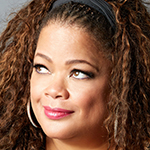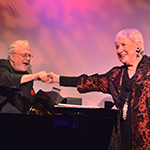Carole J. Bufford
Divine Decadence
Birdland Theater, NYC, July 21, 2023
Reviewed by Alix Cohen

Carole J. Bufford
Photo: Conor Weiss
Carole J. Bufford’s mischievous spirit bobbed in on the rhythmic bass of Tom Hubbard and her eight snapping fingers. “It’s too damn hot,” she sang. “I’d like to coo (pause) with my baby tonight/And pitch the woo (pause) with my baby tonight.” Her eyebrows rose, her nose crinkled, her hips swiveled. Ian Herman’s piano boogied. “It’s too darn hah ah aht!” (“It’s Too Darn Hot” by Cole Porter.)
Tonight’s show featured songs from 10 decades of “the perils and pitfalls of decadence,” a term Bufford defined as “pleasure-seeking indulgence.” As with all programs by this artist, songs we’ve never heard and may never hear again join with classics, each one smartly given context. An extraordinary alchemy exists between Bufford’s choices and Herman’s iconoclastic arrangements. Here, symbiotic talent has created something bigger than the sum of its parts.
From the musical Rags (Charles Strouse/Stephen Schwartz), “Blame It on the Summer Night” is a lustrous ballad of hypnotic atmosphere. Here, with bongo accompaniment by Howie Gordon and Herman’s sensual tango, the song zeroed in on its sexual invitation. One can’t help but wonder what it might have been if Bufford had combined lust with the almost breathless vulnerability of the lyric.
“It’s Too Late,” written by Carole King in the midst of her divorce from Gerry Goffin and Toni Stern’s break up with James Taylor, has always been kind of folksy. Herman’s arrangement was classy—more cashmere than denim. Bufford treated it seriously, eschewing wide eyes and her signature gestures. This original take worked beautifully.
Damien Rice’s “Delicate” ached: “Why’d you sing hallelujah/If it means nothing to ya?/Why’d you sing to me at all?” With her hands wrapped around the mic stand, Bufford seemed more exposed, revealing something we rarely observe. She’s Carole when she speaks, but she sings as an alternative persona. Glimpses of the woman herself are somewhat new to the darker vocals which added a welcomed emotional dimension. Brava—more please.
“You Know I’m No Good” (Amy Winehouse) emerged with trenchant Weimar influence. Bufford dipped and flailed, telling a theatrical story. The inspired pairing of “Ten Cents a Dance” (Richard Rodgers/Lorenz Hart) with “Billie Jean” (Michael Jackson) was her way of “looking at both sides.” Herman again added Weimar coloring. Hubbard’s bass thrum backed the rarely heard verse to “Ten Cents a Dance.” Musical shadows played, then whomp!—“Billie Jean” detonated. Bufford spit out the lyrics; her right leg kept time, as she vibrated. It was terrifically effective.
Also successful was a trio of “daddy” songs that were “creating the story of a gold digger who gets what she wants, then decides she doesn’t want it.” Bobby Troup’s “Daddy” melted into Cole Porter’s “My Heart Belongs to Daddy” with a saucy ease. Looking over his glasses, Herman (“Daddy”), decked Bufford with flashy bracelets and a ring as she slinked by the piano bench. “Da da da da da da daddy,” she sang. With Ray Montagne’s “Sugar Daddy” (originally “Sugar Mama”), the heroine has had enough. “This road you’re walking on is going straight to hell…I just can’t take it no more.” Boy, was she pissed off.
When Solomon Burke originally recorded Bert Russell’s “Cry to Me,” he warned the record company not to call it R&B, which his church deemed corrupting. He suggested “soul.” Bufford threw its lyrics like a lasso, whipping them over her head, circling above and out front. We could hear the pull/release. Herman’s hands worked hard and fast, but the notes were pristine.
The prescient “Nobody Knows You When You’re Down and Out” (Jimmie Cox) was recorded by Bessie Smith before and released just after the Great Crash of 1929. The sound and beat her were burlesque. Feline herself, Bufford toyed with audience as if they were catnip. A song like this might also hark back to German Kabaret, landed historically as it did. The night’s encore, “Are You Havin’ Any Fun” (Sammy Fain/Jack Yellin), was just that. Bufford shimmied, winked, and sashayed—an evangelist for good times.
An excellent show was made more intriguing by the evidence of new facets of Carole J. Bufford’s ample talent. I’m looking forward to seeing where she takes this.





